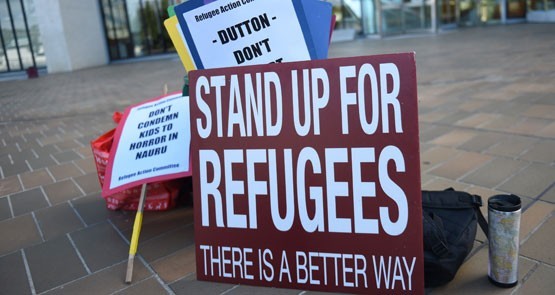
More than a dozen potential witnesses have come forward to seek to be granted immunity from prosecution to speak out about conditions in the Christmas Island detention centre.
The witnesses are seeking to give evidence as part of a class action suit involving thousands of asylum seekers who were detained on Christmas Island between August 2011 and August 2014, with allegations of poor management of asylum seekers’ health and welfare by the government during their time in detention.
Initially the case will focus on a girl, now eight years old, known as AS, who suffered injuries when she was detained on Christmas Island. Her lawyers allege she developed post-traumatic stress disorder, anxiety, a serious dental infection and a stammer while she was held in immigration detention, and that the Australian government has failed to provide adequate healthcare to detainees.
Under the new restrictions in the Australian Border Force Act, AS’ law firm, Maurice Blackburn, cannot interview the witnesses without those witnesses potentially exposing themselves to being in breach of both the federal Border Force Act and the Crimes Act. The former makes it a criminal offence, punishable by up to two years’ jail to disclose information about what is going on in detention centres.
Natalie Sheard, senior associate for Maurice Blackburn, told Crikey that after the firm put a call out for witnesses to come forward late last year, some 15 people raised their hands to be interviewed as part of the case to go before the Supreme Court of Victoria.
“We had to file a document in court on Monday setting out the list of witnesses we wish to interview,” she said. “There were more than that in the document, but about 15 people that contacted us in response to our call out for witnesses. That’s the kind of crazy position we’re in. We know who they are, we’d like to speak to them, and now we’re taking the necessary legal steps to do so.”
Sheard said the witnesses were from a variety of roles within the detention centre, but some were already known to the public, including former International Health and Medical Services (IHMS) doctors who have publicly criticised the Border Force Act‘s confidentiality obligations.
She said the case would be the first test for the Border Force Act and how it related to other confidentiality obligations contained in other pieces of legislation. She said the court realised it was important that Maurice Blackburn was able to get a fair trial for AS by not being blocked by confidentiality obligations.
“It’s not a way to bypass the Border Force Act because the Border Force Act does provide a mechanism that enables the court to give permission to people to speak about protected information in certain circumstances,” Sheard said. “[The Crimes Act is] a different kettle of fish. There are multiple layers of confidentiality obligations … the court has to look at all these confidentiality obligations and work out a way through. We’re obviously very committed to pursuing all legal channels to enable people to speak to us.”
Crikey revealed last year that sub-contracted workers who previously wouldn’t have been considered to be Commonwealth officers under the Crimes Act would be classified as such as a result of the Border Force Act and would now be potentially liable under both laws for disclosing information without authorisation.
The firm hopes it will establish through evidence about AS’ treatment that her issues are systematic issues faced by other children in detention.
“The court will be examining all the systemic problems with the conditions of detention that will be of benefit to other people in the class action.”
The case will not be heard until September. The court has not yet indicated when it will make a decision on which witnesses Maurice Blackburn will be able to interview as part of the case.








Crikey is committed to hosting lively discussions. Help us keep the conversation useful, interesting and welcoming. We aim to publish comments quickly in the interest of promoting robust conversation, but we’re a small team and we deploy filters to protect against legal risk. Occasionally your comment may be held up while we review, but we’re working as fast as we can to keep the conversation rolling.
The Crikey comment section is members-only content. Please subscribe to leave a comment.
The Crikey comment section is members-only content. Please login to leave a comment.